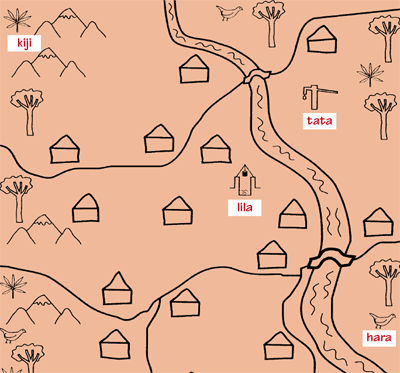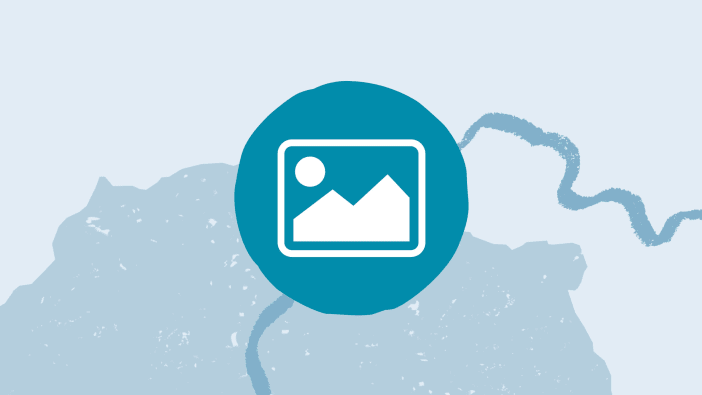In later sessions they may use ranking exercises – looking at the crops they grow. They may be asked to compare how different crops grow – for example if there is too much rain, or a long dry season, or if soils are fertile or infertile. They may compare how much work is involved – in the planting, husbandry and harvesting of crops like coffee, maize, beans, bananas, rice etc. Here the key words might include the crop names, harvest, rain, soils etc.
Preparing seasonal charts to look at how health may vary throughout the year, or to study how farming work loads may vary is another kind of exercise. Group members may study different trees and their uses, or herbal medicines; they may plan their ‘ideal community’. These are just some of the many activities their trainers use with them.
Central issues
The literacy training centres around words and issues that are central to the members. In addition, as they discuss their health and their crops, and as they map their villages, all kinds of other issues may come up. For the first time they look with new eyes on their way of life and many other activities begin to develop alongside the literacy work. For example people may decide to build a tree nursery if they realise they lack good timber for building; they may see the need for a clinic after discussing health issues; they may decide to build a bridge after mapping their local area.
By the end of the literacy course, each circle will have produced 20–30 maps, calendars, charts and diagrams – and each participant will have a copy of these in their books, together with phrases they have written. These become a permanent record for communities, giving them a basis on which to plan their own development. In a REFLECT programme, ‘literacy’ does not come from outside but is based on people’s existing knowledge of their environment and community.
Trial programmes
Three trial programmes were set up in 1993. These were evaluated and compared with other groups using traditional literacy methods in each country in 1995. In Bundibugyo, Uganda, REFLECT was first used in a multi-lingual area where neither of the two main languages was previously written. In Bangladesh it was tried with women’s saving and credit groups in a conservative Islamic area and in El Salvador it was used with a grassroots NGO, Comunidades Unidas de Usulutan, led by ex-guerrillas converting to peaceful methods after ten years in arms.
Results
The REFLECT approach proved to be more effective at teaching literacy and more effective at linking literacy to wider development. Of the adults who initially enrolled in REFLECT circles, 64% achieved basic literacy over a one year period. This compared with 30% in the traditional groups. Participants in REFLECT circles remained well motivated and dropped out in much lower numbers than those in the traditional groups.
There were also various other benefits from participants in the REFLECT programme…
- Members spoke of better self esteem and self realisation. They had improved their ability to analyse and solve problems and express themselves.
- There was increased participation in community organisations. 61% of learners in El Salvador now held positions of responsibility in community organisations which they did not hold before the literacy programme.
- Discussion often led to improvements in local conditions as learners decided to take action as a result of their own analysis they felt a local ownership of the problems and of the possible solutions. Improvements included building grain stores, water pipes, school repairs, tree nurseries, building latrines, clearing rubbish and digging a tubewell.
- There was an improvement in people’s management of their resources within their homes. Women in Bangladesh found their experience with using calendars and charts helped them to plan better.
- The training circles had improved relationships between men and women – with men sharing more of the domestic work and women becoming more involved in key household and community decisions.
- Participants became more aware of health issues.
- Primary schools have reported an increase in enrolment (22% in Uganda) and parents in a third of the literacy circles have started their own literacy training for children.
- The REFLECT approach proved to be lower cost and more cost effective than the traditional literacy training.
Workshops have taken place in a number of countries and now this approach is being used in over 20 countries around the world. If you would like more information, write to…
REFLECT – Action Aid, Hamlyn House, Archway, London, N19 5PG, UK.
by Isabel Carter








